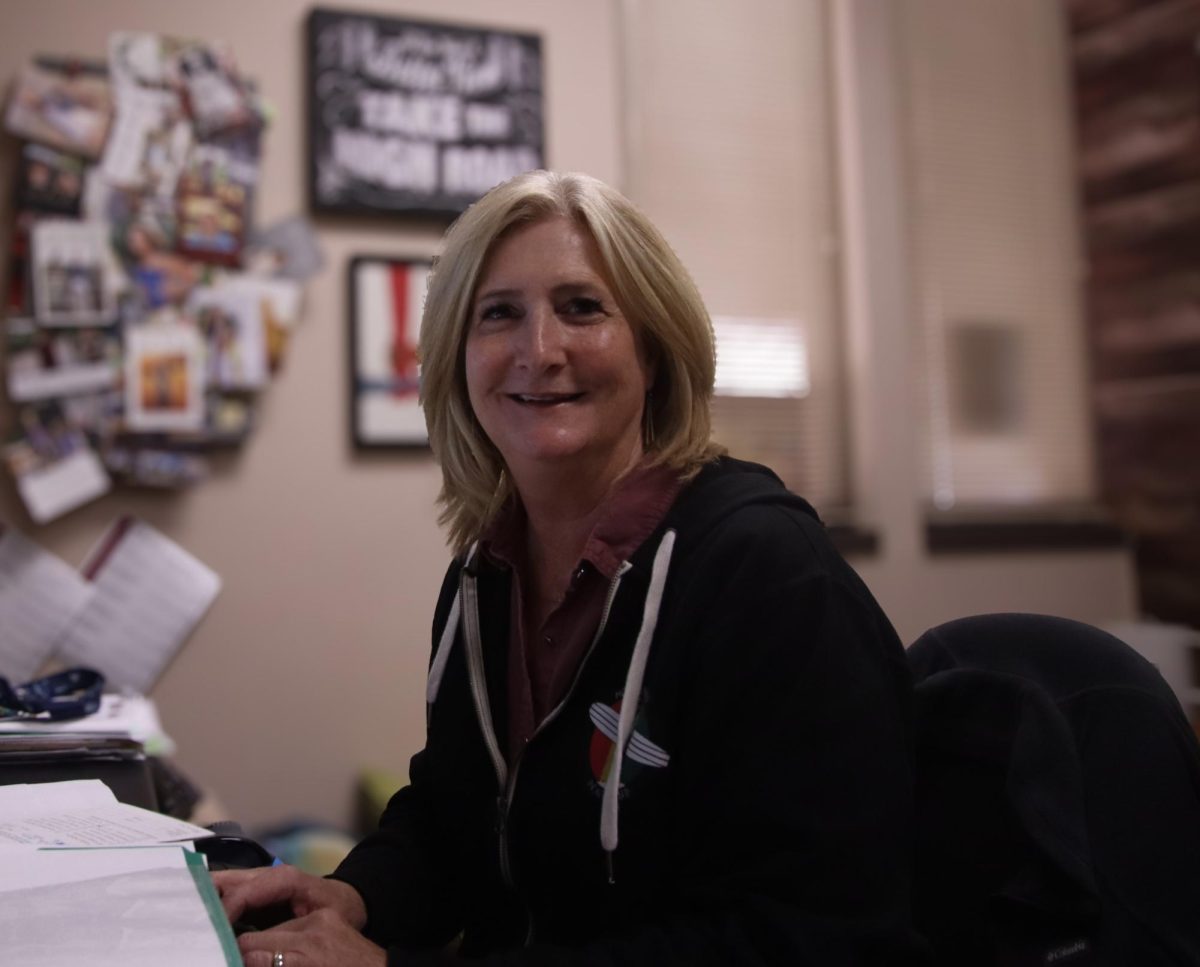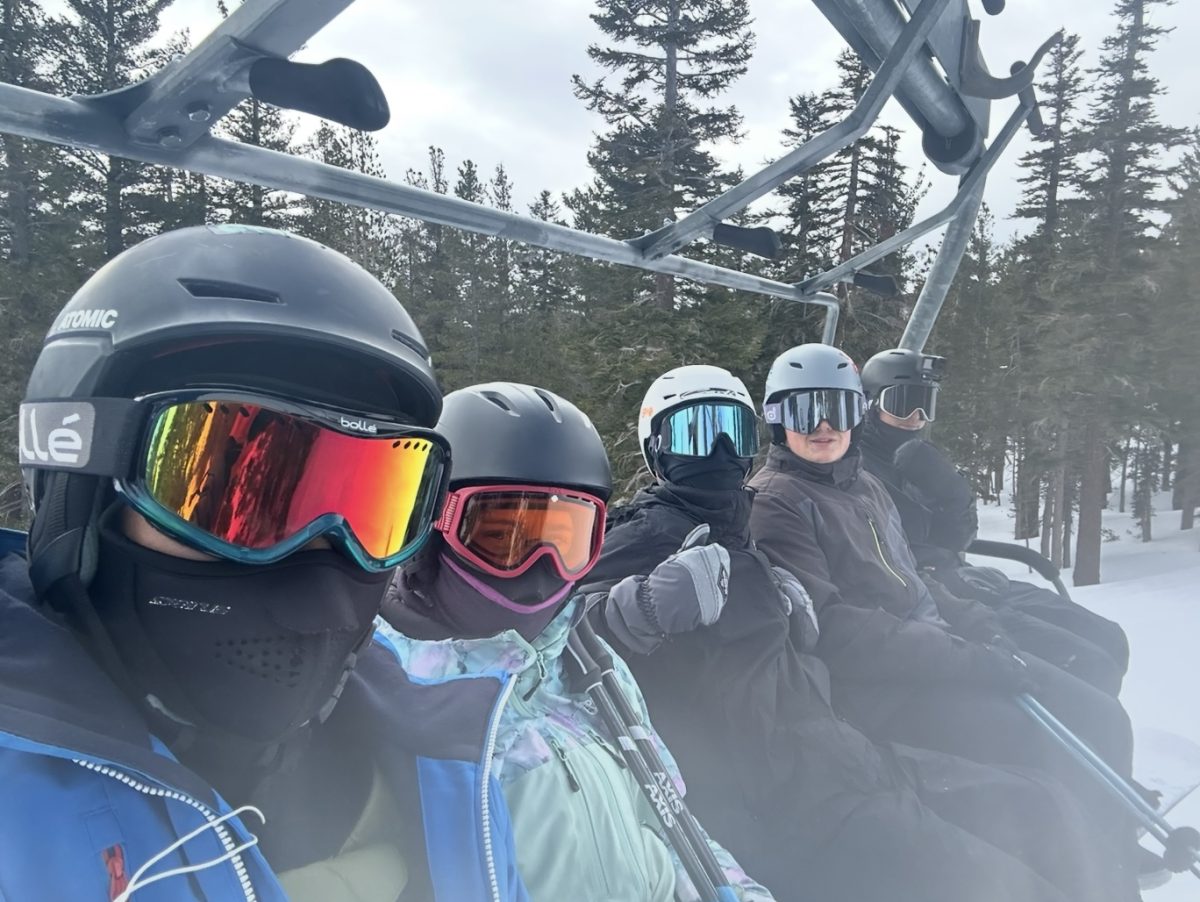Junior Sara Grinager finds her light after a dark period in her life
Her favorite color is gray. She loves fall, and she listens to Halsey nearly constantly. She has a golden-doodle, an older brother, and a hard life. She’s 16 years and 99 days old. She’s changed her hair color seven times, and she plays eight instruments. She’s won 10 awards in various music competitions.
But her struggles with an eating disorder started at the age of nine, with her father threatening her, telling her not to eat certain things or she would get fat and never be loved. At the age of 10, depression crept into her world, urged on by her father’s words which slipped seamlessly into her psyche. At the age of 13 she developed PTSD when her boyfriend sexually assaulted her on their date to the movies. The summer between her sophomore and junior year, her mom checked her into the SLO Mental Hospital because she tried to end it all.
She’s Sara Grinager. She survived an emotional jungle and emerged from it with a newfound hope from the havoc the erupted around and inside her during those three days.
Before the ER
She woke up in her purple, gray, and black sheets, and stretched. She was looking forward, well, as much as she ever looked forward to anything anymore. Since depression had become her life her future had become null and void. She was going to commit suicide by age eighteen. It was a fact. But she was vaguely excited that morning. And then the day collapsed. Her boyfriend, full of concern, shared her problems with her mother. He meant well, but Grinager was infuriated. He had no right! Her subconscious screamed. The next day was uneventful, but the misguided attempt to help Grinager lingered in her memory. She didn’t sleep that night. Instead she rolled around in the purple, turning the only love that kept her alive over and over in her head. The next day the fight that started over text escalated until her boyfriend showed up at her house, uninvited and unexpected. Grinager immediately felt an uneasiness steal over the room. He wouldn’t touch her, wouldn’t even look at her. She knew what was about to happen but she couldn’t admit it to herself at the time.
Eventually Grinager gathered enough courage from her broken heart to say, “You need to make a decision about this. I know you’ve made your decision, just say it.” He admitted that he wanted to work this out but then changed his mind and told her that he wanted to break up, and then Grinager fell to begging. For ten long minutes she begged her only light to stay, pressing, begging, and blowing on her little flame, urged on by the thought of what would happen when it was extinguished.
But he left, left with without saying goodbye. Grinager was left alone, tangled, crying, and alone in her purple dogtooth sheets.
“I felt so utterly alone. Like no one was going to love me ever again. I felt like I was just going through this depression alone, and that [life] wasn’t worth it.”
Eventually she got up, she pulled out her trundle and methodically opened both her drawers embedded into the frame. She clinically counted and recorded the exact number of secret pills that she had stored up in her drawer, the lines of lime green, blue, yellow and white slowly filling up her list.
By her estimates she had over 250, maybe not enough to kill a average sized adult, but for her, a slight, short five foot two teenage girl, surely that would be enough medicine to kill her, end her thought process, and send her out of the darkness where she was huddled, now completely alone.
She was wrong.
The pills didn’t kill her, and the sharp stabbing feelings that they created were covered by the pain of her heartbreak. She was stripped of hope, stripped from her light. After realizing that her attempt had failed she walked to her mother’s room, and opened the door. She didn’t say anything at first, but she didn’t have to.
“Did you break up with him ?” Her mother asked.
Grinager slowly nodded. Her mother, a passionate puzzler, quickly left the online jigsaw puzzle and hugged her daughter tight.
“She held me in her arms for a while, and it was the most comfort I had felt throughout the whole experience.”
Grinager told her mother that she was having a panic attack. Her mother suggested the Mobile Crisis line. At first Grinager refused, but after thinking about it she agreed, and Mobile Crisis told her to go to the ER.
In the ER
Grinager was then sent to the ER, with her mother by her side she walked into the room, still heartbroken, exhausted, and terrified. She glanced about the room while they assigned her a room, a bland TV show about people getting bad tattoos was on. They told her to take a seat and she slipped into a restless sleep. She twisted and jerked about, lured into unconsciousness by the heartbeat of the emergency room.
Grinager was checked in to the ER at 11:00 p.m. the noise of a tv show was empty in substance and the feeling of numbness captured her. The thought of death sounded better than living, overcome by heartache and exhaustion.
“There’s just one problem with hope… When suicidal, you reach a point when death stops scaring you, and that’s when hope starts to scare you. You get so comfortable searching for something just out of reach,” Grinager said.
She would then play the waiting game until Mobile Crisis came to pick her up to take her to SLO Mental Health Hospital, where she would seek further treatment.
SLO Mental Hospital
Around 1:30 am Grinager arrived at SLO mental Hospital, a place that she calls, “The scariest place I’ve ever been.” She wasn’t given a bed for her stay there, but instead she was expected to sleep on the floor. Grinager laid awake all night on the linoleum floor, still fighting an endless roundabout of suicidal thoughts before they dragged her up off of the floor and shoved her into a van. Bewildered, scared, and still sleep deprived, Grinager bounced in the back of the van next to a boy who looked no older than twelve, but whose arms were covered in bandages. She had no idea where they were taking her. An hour later the boy asked for water. The driver coldly informed him that he wouldn’t receive any.
Good Samaritan Hospital
At 9:45am they arrived at Good Samaritan Hospital. Grinager was slipped into yet another room, where she was evaluated for the third time. They called her high risk and took her pants because they had a draw string, and the expression on them could have triggered reactions from the other patients. After she was told that the evaluation was over, they shuffled her back to another room, where her nurse Francis met her. Grinager, lacking three days of sleep, surviving only on fear and suicidal thoughts, burst into tears. Francis offered Grinager a hug, but she refused, a decision that she still regrets today, as she was the first person to be kind to her.
Alone in the room, with the memories from the past 72 hours swirling around in her head, Grinager did the most mundane thing she could think of; she took a shower, and somehow the hot water and the soap washed away the disconnected part of her and restored her humanity. When she hopped out, suddenly feeling cleansed of at least part of her depression, she met her psychiatrist Doddakashi. Grinager was quickly diagnosed as Bipolar 2 with PTSD.
Beyond the darkness
But Grinager’s story doesn’t end with a diagnosis. A year ago she would have said that there was no escape, that the darkness was inescapable. That she would soon be dead. She would have said that there was no point in life, no point in trying, no point in love.
And then Grinager got a puppy, she fought her flashbacks and picked her up a block away from her old mental hospital. She moved to her mother’s room and she burned the sheets that held so many memories of failed and false love.
Grinager is a new person, she looks forward to the surprise that her Bipolar mind brings. She’s dug out her old passion for music, and found a passion for teaching. Her new sheets are a bright blue floral pattern, and her dog crate rests beneath her mattress. Grinager is a story of hope, a story of light, and a story centered around a person, and their real journey through darkness. She’s a story that says that bad times end, and good times come. She’s a survivor, but more than that, she’s a thriver.
“I never thought I would make it to eighteen,” Grinager said. “But I made it.”







